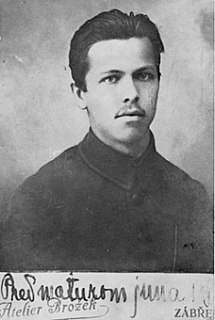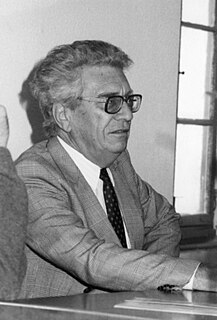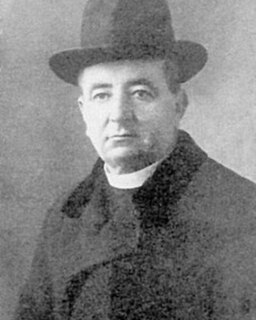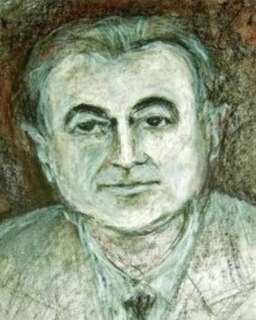
Mijo Mirković, also known by his pen names Miho and Mate Balota, was a prominent Croatian poet, novelist and economist. Considered one of the most prominent Croatian poets of the 20th century and often credited as the greatest Istrian poet, he was called "the greatest Istrian after Labin's Matija Vlačić" by Tone Peruško.

The Miroslav Krleža Institute of Lexicography is Croatia's national lexicographical institution. Based in Zagreb, it was originally established in 1950 as the national lexicographical institute of the Socialist Federal Republic of Yugoslavia. It was renamed after its founder, the Croatian writer Miroslav Krleža, in 1983.
Branko Fučić was a Croatian art historian, archeologist and paleographer.

Glagolitic Alley is a memorial composed of a string of eleven outdoor monuments dotting the road between the villages Roč and Hum in Croatia. Sculptures were erected between 1977 and 1985 to honor the historical Croatian scribal tradition in Glagolitic script. The road is seven kilometers (4.3 mi) long and located in the region of Istria.

Luciano Delbianco was a Croatian electrical engineer, musician and politician who served two nonconsecutive terms as Mayor of Pula.

Zvane (Ivan) Črnja, was a prominent Croatian poet, prose writer, essayist, culturologist, screenwriter, playwright and filmologist, journalist, publicist, polemicist and publisher. He's considered one of the most important names that Istria gave to Croatia in the 20th century. His aliases include: Osip Suri, Barba Zvane, and Filus.

Antun Kalac was a Croatian poet, writer, playwright, literary translator, and revivalist of Croatian nationalism among the Istrian people. He was also a Catholic Priest.

Msgr. Božo Milanović, was a Croatian priest, theologian and politician from Istria, and, along with Antonio Santino, one of the greatest anti-fascists of Istria. He is credited with decisively contributing to the unification of Istria with Croatia.
Daniel Načinović is a Croatian poet, prose writer, essayist, journalist, and translator.
Ernest Jelušić, was a Croatian priest, revivalist and politician.

Luka Kirac, was a Croatian Catholic priest, revivalist of Croatian nationalism and right-wing politician.
The Medulin loan office, was a Croatian savings and loan institution from Medulin, in Istria.

Tone Peruško, was a Croatian educator, social worker and writer.
Lorena Beučić is a Yugoslav former handball player.
Adriana Prosenjak is a Croatian former handball coach and player.
Evelina Galo is a Croatian former handball player.
Suzana Golja (Golja-Zulijani) is a Croatian former handball player.
Karmen Kokot is a Croatian former handball player.
Roberto Sošić is a Croatian former handball player.
Mate Blažina was a Croatian antifascist, military commander and Yugoslav National Hero. After the capitulation of Italy, he joined the partisan movement. He contributed to the liberation of Istria and Gorski Kotar, and for his bravery and actions was honored with the Order of the People's Hero and the Order of Bravery. Blažina died in action in Gorski Kotar, aged 20.









